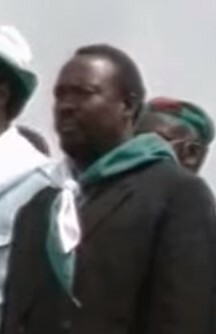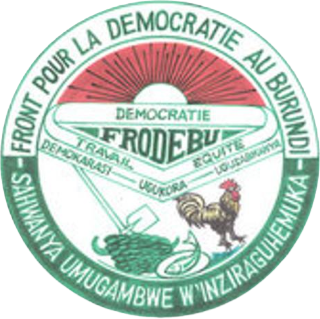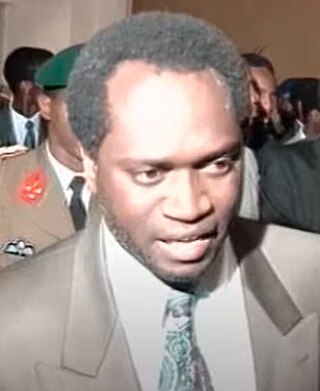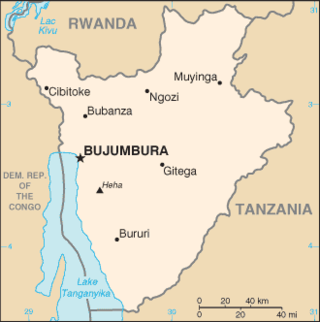
Burundi originated in the 16th century as a small kingdom in the African Great Lakes region. After European contact, it was united with the Kingdom of Rwanda, becoming the colony of Ruanda-Urundi - first colonised by Germany and then by Belgium. The colony gained independence in 1962, and split once again into Rwanda and Burundi. It is one of the few countries in Africa to be a direct territorial continuation of a pre-colonial era African state.

Cyprien Ntaryamira was a Burundian politician who served as President of Burundi from 5 February 1994 until his death two months later. A Hutu born in Burundi, Ntaryamira studied there before fleeing to Rwanda to avoid ethnic violence and complete his education. Active in a Burundian student movement, he cofounded the socialist Burundi Workers' Party and earned an agricultural degree. In 1983, he returned to Burundi and worked agricultural jobs, though he was briefly detained as a political prisoner. In 1986 he cofounded the Front for Democracy in Burundi (FRODEBU), and in 1993 FRODEBU won Burundi's general elections. He subsequently became the Minister of Agriculture and Animal Husbandry on 10 July, but in October Tutsi soldiers killed the president and other top officials in an attempted coup.

Pierre Buyoya was a Burundian army officer and politician who served two terms as President of Burundi in 1987 to 1993 and 1996 to 2003. He was the second-longest-serving president in Burundian history.

The Front for Democracy in Burundi is a political party in Burundi.

Sylvestre Ntibantunganya is a Burundian politician. He was President of the National Assembly of Burundi from 23 December 1993 to 30 September 1994, and President of Burundi from 6 April 1994 to 25 July 1996.

Melchior Ndadaye was a Burundian banker and politician who became the first democratically elected and first Hutu president of Burundi after winning the landmark 1993 election. Though he attempted to smooth the country's bitter ethnic divide, his reforms antagonised soldiers in the Tutsi-dominated army, and he was assassinated amidst a failed military coup in October 1993, after only three months in office. His assassination sparked an array of brutal tit-for-tat massacres between the Tutsi and Hutu ethnic groups, and ultimately led to the decade-long Burundi Civil War.

Jean-Baptiste Bagaza was a Burundian army officer and politician who ruled Burundi as president and de facto military dictator from November 1976 to September 1987.

The Burundian Civil War was a civil war in Burundi lasting from 1993 to 2005. The civil war was the result of longstanding ethnic divisions between the Hutu and the Tutsi ethnic groups. The conflict began following the first multi-party elections in the country since its independence from Belgium in 1962, and is seen as formally ending with the swearing-in of President Pierre Nkurunziza in August 2005. Children were widely used by both sides in the war. The estimated death toll stands at 300,000.

The Union for National Progress is a nationalist political party in Burundi. Initially it emerged as a nationalist united front in opposition to Belgian colonial rule but subsequently became an integral part of the one-party state established by Michel Micombero after 1966. Dominated by members of the Tutsi ethnic group and increasingly intolerant to their Hutu counterparts, UPRONA remained the dominant force in Burundian politics until the latter stages of the Burundian Civil War in 2003. It is currently a minor opposition party.

Sylvie Kinigi is a Burundian politician and economist who served as prime minister of Burundi from 10 July 1993 to 7 February 1994, and acting president from November 1993 to 5 February 1994, making her the second African woman to serve as a president.

Presidential elections were held in Burundi on 1 June 1993 following the approval of a new constitution in a referendum the previous year. They were the first multi-party elections for the presidency, the only previous elections in 1984 having been held at a time when the country was a one-party state. They were also only the second contested national elections held in the country since independence in 1962.

The Party for National Recovery is a minor political party in Burundi. It was founded in May 1994 by the former president Jean-Baptiste Bagaza. Bagaza, an ethnic Tutsi, had established a military dictatorship in Burundi from 1976 until his deposition in 1987, after which he lived in exile. He was allowed to return to the country during its democratization under Pierre Buyoya after 1992.

The Rally for the People of Burundi is a political party in Burundi. It was headed by Ernest Kabushemeye, until his assassination in 1995, since when Balthazar Bigirimana has been party leader.

The Rally for Democracy and Economic and Social Development is a small, predominantly ethnic Tutsi political party in Burundi.

Mass killings of Tutsis were conducted by the majority-Hutu populace in Burundi from 21 October to December 1993, under an eruption of ethnic animosity and riots following the assassination of Burundian President Melchior Ndadaye in an attempted coup d'état. The massacres took place in all provinces apart from Makamba and Bururi, and were primarily undertaken by Hutu peasants. At many points throughout, Tutsis took vengeance and initiated massacres in response.
These are some of the articles related to Burundi on the English Wikipedia:

Ethnic groups in Burundi include the three main indigenous groups of Hutu, Tutsi and Twa that have largely been emphasized in the study of the country's history due to their role in shaping it through conflict and consolidation. Burundi's ethnic make-up is similar to that of neighboring Rwanda. Additionally, recent immigration has also contributed to Burundi's ethnic diversity. Throughout the country's history, the relation between the ethnic groups has varied, largely depending on internal political, economic and social factors and also external factors such as colonialism. The pre-colonial era, despite having divisions between the three groups, saw greater ethnic cohesion and fluidity dependent on socioeconomic factors. During the colonial period under German and then Belgian rule, ethnic groups in Burundi experienced greater stratifications and solidification through biological arguments separating the groups and indirect colonial rule that increased group tensions. The post-independence Burundi has experienced recurring inter-ethnic violence especially in the political arena that has, in turn, spilled over to society at large leading to many casualties throughout the decades. The Arusha Agreement served to end the decades-long ethnic tensions, and the Burundian government has stated commitment to creating ethnic cohesion in the country since, yet recent waves of violence and controversies under the Pierre Nkurunziza leadership have worried some experts of potential resurfacing of ethnic violence. Given the changing nature of ethnicity and ethnic relations in the country, many scholars have approached the topic theoretically to come up with primordial, constructivist and mixed arguments or explanations on ethnicity in Burundi.

The 1996 Burundian coup d'état was a military coup d'état that took place in Burundi on 25 July 1996. In the midst of the Burundi Civil War, former president Pierre Buyoya deposed Hutu President Sylvestre Ntibantunganya. According to Amnesty International, in the weeks following the coup, more than 6,000 people were killed in the country. This was Buyoya's second successful coup, having overthrown Jean-Baptiste Bagaza in 1987.

On 21 October 1993, a coup was attempted in Burundi by a Tutsi–dominated army faction. The coup attempt resulted in assassination of Hutu President Melchior Ndadaye and the deaths of other officials in the constitutional line of presidential succession. François Ngeze was presented as the new President of Burundi by the army, but the coup failed under domestic and international pressure, leaving Prime Minister Sylvie Kinigi in charge of the government.
The 2010 Senate of Burundi sat from 2010 to 2015.















